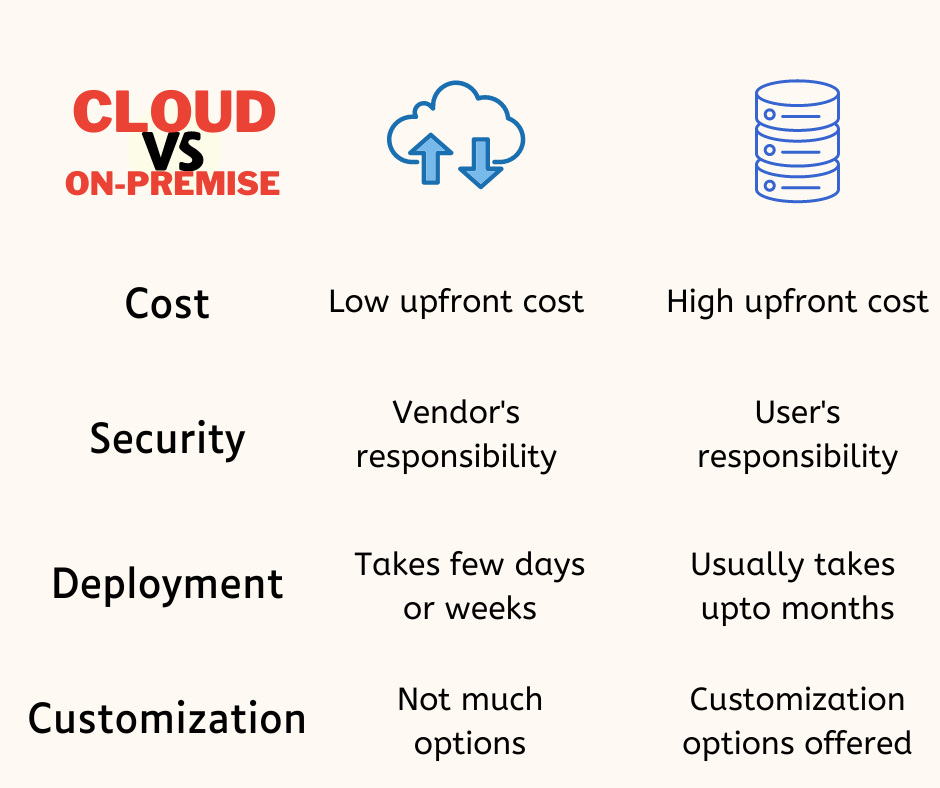Choosing whether to use an on-premise ERP system or a cloud ERP software will be an important factor when choosing a new enterprise resource planning system. Increasingly, ERP systems are based on the cloud. Today, almost every ERP vendor offers some form of cloud deployment. Some have even abandoned their on-premise ERP products entirely. In spite of this, traditional on-premise ERP systems have several advantages that small and midsize businesses may want to consider. Considering the needs of your business.
Cloud ERP
A provider hosts and manages a cloud based ERP system remotely. SaaS is the most common cloud based ERP solution. Application hosting on the vendor’s servers is provided via the internet as a service. The cost of cloud hosting is usually based on a recurring fee for support, training, and updates.
On- Premise ERP
An organisation maintains and deploys an on-premise ERP system in-house. Using an on-premise ERP system gives a company better control over data security since it all resides on the company’s servers. A perpetual license for on-premise software costs one time while there will be recurring fees applied to support, training, and updates.
There are also “hybrid” deployments, in which cloud software is also hosted on a private server.
Analyzing the difference between On Premise and Cloud ERP
Using Cloud hosting or not they have their own advantages and disadvantages. When you start analyzing the important features of both, then you can identify the parameters required for your business.
1- Total Ownership Cost
Cloud ERP software is based on a SaaS model, which means that you are charged based on the features you utilize. Cloud ERP providers take full control of the back end, which allows your internal IT resources to focus on business innovation and growth.
On-premise ERP involves the initial investment along with the continuous investments for training, support, and upgrades. Additionally, upgrading on-premise systems may require users to reinstall the platform on a number of workstations and redo the multiple integrations and customization made to the previous software.
2- Data Security
A professional service provider will be able to manage your cloud ERP software more effectively with multiple security protocols for data disaster and recovery. Consequently, you are less likely to experience hardware or software malfunctions that could negatively impact your business.
With on-premise ERP, your IT team is in control of data security. Your data can be at risk of malicious attacks if they do not have adequate security protocols or hardware.
3- Deployment
Cloud ERP deployment is simple if your service provider implements and hosts it on their server. Therefore, no new resources or hardware are required, and deployment is often completed in a few days or weeks.
In the case of an On-Premise ERP system, it takes additional time to prepare the required infrastructure and prepare your internal IT team for the installation process, which extends the deployment period.
4- Mobility and Accessibility
Remote access to an on-premises ERP system is possible, but typically, it requires a mobile device and third-party software support. If employees are accessing files on personal devices, it’s essential to enforce stringent security measures. Security and communication difficulties can be present.
Due to the ease of access to business resources, cloud ERP software increases employee engagement. All you need is a working internet connection to access your data on a mobile device.
5- Maintenance and Upgrades
In cloud based ERP systems, the vendor is responsible for implementing routine software updates. Therefore, not necessary to have an in-house developer or IT administrator to handle this change.
In this case, the maintenance and updating of an ERP system installed on-premises requires a full-time IT administrator.

Organizations leaning towards Cloud ERP Solution
Cloud hosting provides an immediate advantage in terms of equipment savings. Companies need not have to purchase and maintain hardware. Working with a trusted cloud service allows employees to access their data from anywhere using any device. Most industries will move to cloud-based technologies by 2025.The adoption rate of cloud solutions is higher among service-based companies than among manufacturing and distribution companies, but all businesses will benefit from it in the not too distant future. Additionally, cloud based ERP systems are simple to incorporate into your current IT infrastructure and doesn’t require any extra hardware. With a cloud based ERP system, features are constantly being added, enhancing the software’s capability with each update. By eliminating maintenance hassles, you can focus on improving the facility by adding new features.
Conclusion
As ERP solution providers who have implemented SAP Business One solutions for numerous years, we have learned that deciding between Cloud ERP and On-Premise ERP comes down to your business requirements as well as your propensity to adopt technology in two distinct ways.
An ERP software hosted on cloud reduces initial costs and includes maintenance.
On the other hand, you have your On-Premise ERP deployment. In this instance, the ERP software and infrastructure are on your premises, and you are responsible for setting them up and maintaining them on a continuing basis.
Ultimately, the best advice for choosing between these two is to ask plenty of questions, find the right answers, and then choose the option that best suits your business needs.

